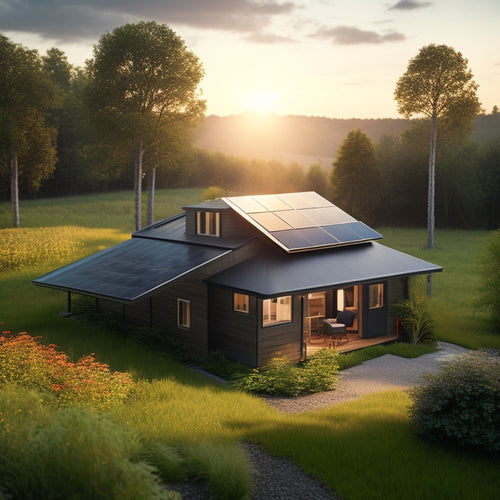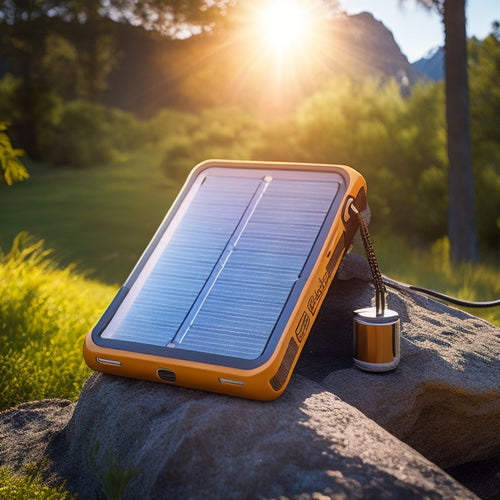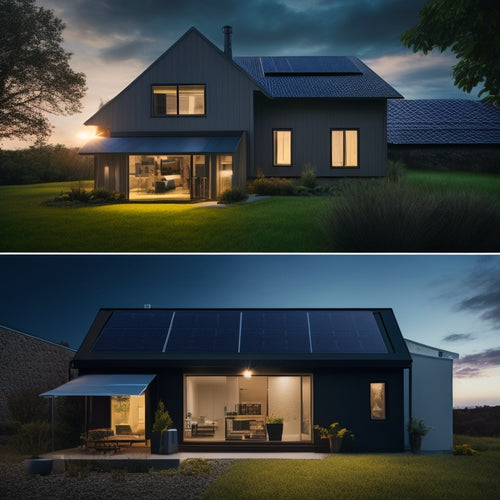
7 Tips for Off-Grid Home Energy Independence
Share
To achieve off-grid home energy independence, start by evaluating your energy needs to establish a baseline and identify areas for improvement. Next, choose the right solar panels that match your energy requirements, and pair them with suitable battery storage to guarantee a steady power supply. Design a reliable charge controller to efficiently capture solar energy, and optimize your energy efficiency by implementing sustainable practices and using energy-efficient appliances. Regularly monitor and maintain your system to prevent equipment failure, and plan for energy storage backup during low-energy periods. By following these tips, you'll be well on your way to energy self-sufficiency - and there's still more to uncover about customizing your off-grid energy system.
Overview
- Assess energy needs by tracking consumption and conducting energy audits to identify areas for improvement and optimize energy usage.
- Choose high-efficiency solar panels and batteries that match assessed energy needs, ensuring adequate power generation and storage.
- Implement sustainable practices like turning off lights and electronics when not in use, and utilize energy-efficient appliances to lower overall consumption.
- Regularly monitor system performance, perform routine maintenance tasks, and utilize software tools for energy usage analysis and optimization.
- Explore alternative energy sources and diversify energy supply to reduce reliance on a single energy source and achieve off-grid home energy independence.
Assess Your Energy Needs First
Determining your energy requirements is essential to achieving off-grid home energy independence. You need to know how much energy you consume daily to size your system correctly.
Start by tracking your energy consumption for a month to get an accurate representation. Look at your past utility bills to identify patterns and peak usage periods. Conducting energy audits energy efficiency can also help you identify inefficiencies and opportunities to maximize your renewable energy investment.
Consider your lifestyle adjustments, such as reducing energy-intensive habits or investing in energy-efficient appliances.
Calculate your total daily energy consumption in watt-hours (Wh) by adding up the power ratings of all your devices and appliances. This will give you a baseline to work from when designing your off-grid energy system.
Choose the Right Solar Panels
When selecting solar panels for your off-grid home, you'll want to prioritize high-efficiency panels to maximize energy production per unit area.
Consider high-efficiency solutions that employ advanced MPPT technology for ideal energy capture, which can greatly impact your energy independence.
Your energy needs, as assessed earlier, will also influence your panel choice, ensuring you generate enough power to support your requirements.
Additionally, consider the durability of the panels, as a longer lifespan will reduce replacement costs and minimize maintenance over time.
Panel Efficiency Matters
Optimize your solar panel investment by selecting high-efficiency panels that maximize energy production per unit area. With recent solar panel innovations, you can achieve higher energy conversion efficiency, reducing the space required for your off-grid energy system. This means more power from a smaller footprint, giving you greater freedom and independence.
| Panel Efficiency | Benefits |
|---|---|
| 15%-18% | Standard efficiency, suitable for small systems |
| 18%-20% | Higher efficiency, ideal for medium-sized systems |
| 20%-22% | Premium efficiency, perfect for large systems or space-constrained areas |
When choosing your solar panels, consider the trade-offs between efficiency, cost, and space requirements. By selecting the right panels for your needs, you'll be one step closer to achieving energy independence.
Assess Your Energy Needs
About 30 kilowatt-hours (kWh) of electricity per day is the average energy consumption of an off-grid home. However, your energy needs may vary depending on your lifestyle habits and appliances.
To guarantee accurate assessments, it's crucial to conduct an energy audit to identify peak usage times and monitor seasonal fluctuations.
To choose the right solar panels, you need to assess your energy consumption accurately. Start by calculating your daily energy usage in kWh.
Consider the wattage and usage hours of your appliances, such as lights, refrigerators, and computers. You can use energy monitoring tools or consult with a solar expert to help you determine your energy needs.
Durability Is Key
You'll need at least 2-3 kilowatts of solar panel capacity to meet the average daily energy consumption of an off-grid home. When choosing the right solar panels, durability is key. You want a system that can withstand harsh weather conditions and last for decades. Consider the following factors to guarantee you get a reliable and efficient system:
| Factor | Description | Impact on System Longevity |
|---|---|---|
| Material Selection | Choosing high-quality materials like tempered glass and anodized aluminum frames guarantees weather resistance and reduces maintenance. | High |
| Component Quality | Selecting components from reputable manufacturers assures better performance and longer lifespan. | High |
| Installation Techniques | Proper installation techniques, such as secure mounting and wiring, prevent damage and guarantee peak performance. | Medium |
| Performance Testing | Testing the system's performance regularly helps identify potential issues early on, reducing downtime and maintenance costs. | Medium |
| Maintenance Strategies | Developing a maintenance schedule and performing regular checks guarantees the system operates at its best. | Low |
Select Suitable Battery Storage
When selecting a battery storage system for your off-grid home, you'll need to evaluate the type of battery that suits your needs, as different types offer varying levels of performance, durability, and cost.
You'll also need to plan the energy capacity of your battery bank, considering your daily energy usage and the amount of backup power you require during periods of low solar input.
Battery Type Matters
In tandem with selecting the right solar panel and inverter, choosing a suitable battery type is essential for achieving reliable and efficient off-grid home energy independence.
You'll want to take into account lithium batteries, which offer advantages like higher energy density and longer lifespans compared to traditional lead acid batteries. Lithium batteries can last up to 10 years, with a higher number of charging cycles.
However, they're more sensitive to temperature effects, requiring a narrower operating range. Proper maintenance is imperative, including monitoring temperature and state of charge.
Safety considerations are also significant, such as installing batteries in a well-ventilated area and following manufacturer guidelines.
Energy Capacity Planning
Selecting the right battery type is just the starting point for achieving off-grid home energy independence.
Now, it's time to determine the suitable energy capacity for your system. You'll need to calculate your daily energy consumption to size your battery bank correctly. Consider your peak energy usage, average daily usage, and the number of days you want your system to operate during a power outage.
System scalability is essential, as you may want to add more solar panels or batteries in the future. Aim to oversize your battery bank by 20-30% to account for unexpected energy needs.
Design a Reliable Charge Controller
You need a charge controller that efficiently captures energy from your solar panels or wind turbines while protecting your battery bank from overcharging.
When selecting a charge controller, consider the type that best suits your system. There are two primary charge controller types: pulse-width modulation (PWM) and maximum power point tracking (MPPT).
PWM controllers are suitable for small systems, while MPPT controllers are ideal for larger systems or hybrid systems that combine solar and wind power. Hybrid systems require a more advanced charge controller that can handle multiple energy sources.
Look for a controller with features like overcharge protection, low-voltage disconnect, and temperature compensation to guarantee your battery bank remains healthy and efficient.
Optimize Your Energy Efficiency
With your reliable charge controller in place, it's time to focus on maximizing the energy efficiency of your off-grid home.
Conducting energy audits helps identify areas of energy waste, allowing you to prioritize insulation upgrades and replace inefficient appliances with energy-efficient ones.
Smart thermostats can also optimize your heating and cooling systems.
By incorporating passive design principles, you can reduce your reliance on renewable sources and minimize energy consumption.
Implementing sustainable practices like turning off lights and electronics when not in use can also make a significant impact.
Monitor and Maintain Your System
A well-designed off-grid energy system requires regular monitoring and maintenance to guarantee peak performance and extend its lifespan.
You'll need to keep track of your system's performance to identify areas for improvement. Regular system monitoring helps you detect potential issues before they become major problems.
Implement routine maintenance tasks, such as cleaning solar panels and inspecting cables, to prevent equipment failure. Performance tracking allows you to troubleshoot issues using techniques like energy audits.
Utilize software tools to analyze your energy usage and identify opportunities for optimization. Consider hardware upgrades to improve your system's efficiency and longevity.
Plan for Energy Storage Backup
During extended periods of low energy production, a reliable energy storage backup plan guarantees your off-grid home remains powered.
You'll want to evaluate a backup system that guarantees continuous energy supply when your primary source is compromised. Look for energy storage systems with high storage longevity, allowing them to retain their capacity over time.
Additionally, opt for backup scalability, enabling you to easily add more storage capacity as your energy needs grow. This will assure your off-grid home remains energy-independent, even during prolonged periods of low energy production.
Frequently Asked Questions
Can I Use Wind Power Instead of Solar Panels for Energy Generation?
You can opt for wind power, choosing from horizontal or vertical axis wind turbine types, but consider energy storage solutions to stabilize output, as wind patterns vary, and guarantee a reliable supply to meet your off-grid energy demands.
Are There Any Government Incentives for Off-Grid Home Energy Systems?
You're showered with government goodies! You'll reap tax credits, renewable grants, energy rebates, and installation incentives, saving you thousands on your off-grid system, making your independence dreams a financially viable reality, faster than you thought possible!
How Do I Ensure My System Complies With Local Building Codes?
You'll need to research and comply with local building codes and regulations to guarantee your off-grid system meets standards; consult with local authorities, review ordinances, and obtain necessary permits to avoid costly rework or even system shutdown.
Can I Add More Solar Panels to My Existing System Later?
You can expand your existing solar panel system, but first, confirm the new panels are compatible and check your inverter's capacity to handle the added power. Research system expansion options to determine the best approach for your setup.
Will My Off-Grid System Still Work During a Power Grid Failure?
As the storm clouds of grid failure gather, your off-grid system stands strong, a guiding light of independence, thanks to its system reliability and energy storage, ensuring your lights stay on while the world around you goes dark.
Ready to Buy
You've taken the first step towards energy independence by considering off-grid power for your home. Now, it's time to utilize the sun's energy and break free from the grid. Remember, a well-designed system is like a finely-tuned orchestra, where each component plays an essential role in harmony. By following these 7 tips, you'll be well on your way to creating a melody of sustainability that will power your home for years to come.
Related Posts
-

Diy Off Grid Solar
By embracing DIY off-grid solar, you can break free from grid dependence, slashing your energy bills by up to 90% and...
-

Fastest Solar Chargers for Emergency Power
When choosing the fastest solar chargers for emergency power, you need to focus on features like rapid charging capab...
-

Cost of Home Solar Battery
You're looking to invest in a home solar battery to reduce your grid reliance, but you're curious about the cost. The...


